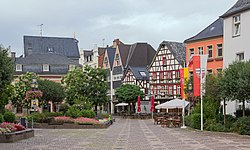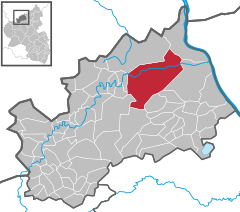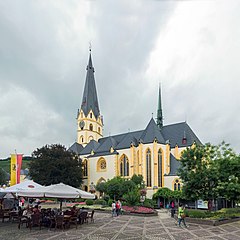You can help expand this article with text translated from the corresponding article in German. Click for important translation instructions.
|
| Bad Neuenahr-Ahrweiler | |
|---|---|
| Town | |
 | |
 Coat of arms Coat of arms | |
Location of Bad Neuenahr-Ahrweiler within Ahrweiler district
 | |
  | |
| Coordinates: 50°32′41″N 7°6′48″E / 50.54472°N 7.11333°E / 50.54472; 7.11333 | |
| Country | Germany |
| State | Rhineland-Palatinate |
| District | Ahrweiler |
| Subdivisions | Ortsbezirke 13 |
| Government | |
| • Mayor (2017–25) | Guido Orthen (CDU) |
| Area | |
| • Total | 63.4 km (24.5 sq mi) |
| Elevation | 99 m (325 ft) |
| Population | |
| • Total | 26,669 |
| • Density | 420/km (1,100/sq mi) |
| Time zone | UTC+01:00 (CET) |
| • Summer (DST) | UTC+02:00 (CEST) |
| Postal codes | 53474 |
| Dialling codes | 02641; 02646 |
| Vehicle registration | AW |
| Website | www.bad-neuenahr-ahrweiler.de |
Bad Neuenahr-Ahrweiler (German pronunciation: [baːt ˌnɔʏənʔaːɐ̯ˈʔaːɐ̯vaɪlɐ]) is a spa town in the German Bundesland of Rhineland-Palatinate that serves as the capital of the Ahrweiler district. The A61 motorway connects the town with cities like Cologne and Mainz. Formed by the merging of the towns (now districts) of Bad Neuenahr and Ahrweiler in 1969, Bad Neuenahr-Ahrweiler consists of 11 such districts.
Geography
Bad Neuenahr-Ahrweiler rests in the Ahr valley (German: Ahrtal) on the left bank of the Rhine river in the north of Rhineland-Palatinate. Bad Neuenahr-Ahrweiler nestles in the Ahr Hills (German: Ahrgebirge).
The highest hill in the area is the Häuschen at 506 metres (1,660 ft) above sea level. Nearby are the hills of Steckenberg, Neuenahrer, and Talerweiterung. There used to be castles on the last two of these hills.
Neighbouring communities
Bad Neuenahr-Ahrweiler is surrounded by the following villages and towns (clockwise from the north): Grafschaft, Remagen, Sinzig, Königsfeld, Schalkenbach, Heckenbach, Kesseling, Rech and Dernau. The nearest cities are Bonn and Koblenz.
Districts
Bad Neuenahr is divided into Ortsbezirke which consist of one or more districts. The Ortsbezirke are represented by local councils. The largest district, Bad Neuenahr, was originally made up of three communities, which are still seen as districts.
Population statistics as of 31 March 2013 (main and secondary residence):
| Local District | Subdivision | Population (30 June 2015) |
|---|---|---|
| Ahrweiler | District: Ahrweiler | 7,411 |
| Bachem | District: Bachem | 1,214 |
| Bad Neuenahr | Districts: Beul, Hemmessen and Wadenheim | 12,132 |
| Gimmigen | District: Gimmigen | 735 |
| Heimersheim | District: Heimersheim and Ehlingen | 3,194 |
| Heppingen | District: Heppingen | 873 |
| Kirchdaun | District: Kirchdaun | 368 |
| Lohrsdorf | District: Lohrsdorf and Green | 672 |
| Ramersbach | District: Ramersbach | 567 |
| Walporzheim | District: Walporzheim and Marienthal | 698 |
Climate
| Climate data for Bad Neuenahr-Ahrweiler (1991-2020) | |||||||||||||
|---|---|---|---|---|---|---|---|---|---|---|---|---|---|
| Month | Jan | Feb | Mar | Apr | May | Jun | Jul | Aug | Sep | Oct | Nov | Dec | Year |
| Record high °C (°F) | 16.9 (62.4) |
20.7 (69.3) |
25.4 (77.7) |
30.5 (86.9) |
33.4 (92.1) |
36.4 (97.5) |
40.4 (104.7) |
38.9 (102.0) |
34.5 (94.1) |
28.5 (83.3) |
22.4 (72.3) |
19.0 (66.2) |
40.4 (104.7) |
| Mean daily maximum °C (°F) | 5.9 (42.6) |
7.3 (45.1) |
11.4 (52.5) |
15.9 (60.6) |
19.8 (67.6) |
22.9 (73.2) |
25.2 (77.4) |
25.1 (77.2) |
20.7 (69.3) |
15.5 (59.9) |
10.0 (50.0) |
6.5 (43.7) |
15.5 (59.9) |
| Daily mean °C (°F) | 2.9 (37.2) |
3.5 (38.3) |
6.5 (43.7) |
10.2 (50.4) |
14.1 (57.4) |
17.2 (63.0) |
19.2 (66.6) |
18.7 (65.7) |
14.7 (58.5) |
10.5 (50.9) |
6.5 (43.7) |
3.6 (38.5) |
10.6 (51.1) |
| Mean daily minimum °C (°F) | −0.3 (31.5) |
−0.2 (31.6) |
2.1 (35.8) |
4.6 (40.3) |
8.4 (47.1) |
11.6 (52.9) |
13.5 (56.3) |
13.1 (55.6) |
9.6 (49.3) |
6.0 (42.8) |
2.9 (37.2) |
0.5 (32.9) |
6.0 (42.8) |
| Record low °C (°F) | −20.3 (−4.5) |
−21.8 (−7.2) |
−14.1 (6.6) |
−6.4 (20.5) |
−2.7 (27.1) |
1.6 (34.9) |
4.0 (39.2) |
4.5 (40.1) |
0.1 (32.2) |
−7.0 (19.4) |
−12.5 (9.5) |
−20.1 (−4.2) |
−21.8 (−7.2) |
| Average precipitation mm (inches) | 46.0 (1.81) |
42.0 (1.65) |
48.0 (1.89) |
39.0 (1.54) |
58.0 (2.28) |
60.0 (2.36) |
62.0 (2.44) |
64.0 (2.52) |
53.0 (2.09) |
49.0 (1.93) |
46.0 (1.81) |
53.0 (2.09) |
620.0 (24.41) |
| Source: wetterlabs.de: Bad Neuenahr-Ahrweiler | |||||||||||||
History





Antiquity
Discoveries dating to the Hallstatt period (1000–500 BC) show farming activity by Celts that dwelled in the area. The Gallic Wars (58–50 BC) resulted in the forced relocation of the indigenous Eburones to the Middle Rhine. Several Roman discoveries date from the 1st to 3rd centuries. Most notable is the Villa Rustica of Bad Neuenahr [de].
Middle Ages
In 893 AD, Ahrweiler was mentioned as Arwilre, Arewilre, Arewilere, and later Areweiller in the Prüm Urbar (register of estates owned by Prüm Abbey). The abbey of Ahrweiler owned a manor with 24 farmsteads; 50 acres of farmland and 76 acres of vineyards. The first mention of a parish church occurred in Neuenahr Castle and surrounding county (Newenare) from 1204 to 1225. In 1246 was founded one of the oldest German inns Gasthaus Sanct Peter.
Modern Times
Close to Bad Neuenahr-Ahrweiler, the national Government bunker was built between 1960 and 1972 inside two abandoned railway tunnels that were built as part of the Strategic Railway. The bunker was maintained and kept in a working condition for about 30 years and decommissioned in 1997. The location is a museum since February 2008.
During the 2021 European floods much of the town was submerged and many died.
Economy
- The German Army's (German: Deutsches Heer) Logistics Centre (main depot) is located in an underground facility.
- Bad Neuenahr-Ahrweiler has been home to the traditional mineral water "Heppinger" since 1584.
- The "Apollinaris" mineral water company was founded in Bad Neuenahr in 1852.
Transport
The town has five stations on the Ahr Valley Railway and provides hourly connections to Bonn.
Sport
- Bad Neuenahr-Ahrweiler is the home of the successful women's football team, SC 07 Bad Neuenahr.
Twin towns – sister cities
See also: List of twin towns and sister cities in GermanyBad Neuenahr-Ahrweiler is twinned with:
 Brasschaat, Belgium
Brasschaat, Belgium
Notable people

- Cyrillus Jarre (1878–1952), Franciscan Archbishop in Jinan
- Markus Stenz (born 1965), conductor
- Björn Glasner (born 1973), cyclist
- Jan van Eijden (born 1976), cyclist
- Pierre Kaffer (born 1976), racing driver
- Bianca Rech (born 1981), footballer
- Ricarda Funk (born 1992), canoeist
Associated with the town
- Karl Marx (1818–1883), philosopher and economist, stayed in a spa resort in Bad Neuenahr in 1877
- Ludwig van Beethoven (baptised 17 December 1770 – 26 March 1827), is said to have visited the town in his youth. The Beethovenhaus is named in his honor.
- Peter Friedhofen (1819–1860), founder of the Charitable Brethren of Maria Hilf, who practiced his trade first in Ahrweiler
- Wolfgang Müller von Königswinter (1816–1873), novelist and poet, died in Bad Neuenahr
- Blandine Merten (1883–1918), Ursuline nun near Ahrweiler
- Ebba Tesdorpf (1851–1920), illustrator and watercolorist, died in Ahrweiler
- Paul Metternich (1853–1934), diplomat, died in the district of Heppingen
- Max von Schillings (1868–1933), composer and conductor
- Christian Hülsmeyer (1891–1957), inventor, physicist and entrepreneur, died in Ahrweiler
References
- Wahlen der Bürgermeister der verbandsfreien Gemeinden, Landeswahlleiter Rheinland-Pfalz, accessed 30 July 2021.
- "Bevölkerungsstand 2022, Kreise, Gemeinden, Verbandsgemeinden" (PDF) (in German). Statistisches Landesamt Rheinland-Pfalz. 2023.
- "Zahlen & Daten Bad Neuenahr-Ahrweiler". Stadt Bad Neuenahr-Ahrweiler – offizielle Website.
- "More than 100 dead as flood 'catastrophe' hits Germany and Belgium". the Guardian. July 16, 2021.
- "Städtepartnerschaft mit Brasschaat". bad-neuenahr-ahrweiler.de (in German). Bad Neuenahr-Ahrweiler. Retrieved 2021-03-10.
- Frick, Hans. "Beethoven in Ahrweiler". Kreisverwaltung Ahrweiler. Retrieved 7 February 2024.
External links
- "Neuenahr" . Encyclopædia Britannica. Vol. 19 (11th ed.). 1911. p. 425.
- Official website
 (in German)
(in German)
